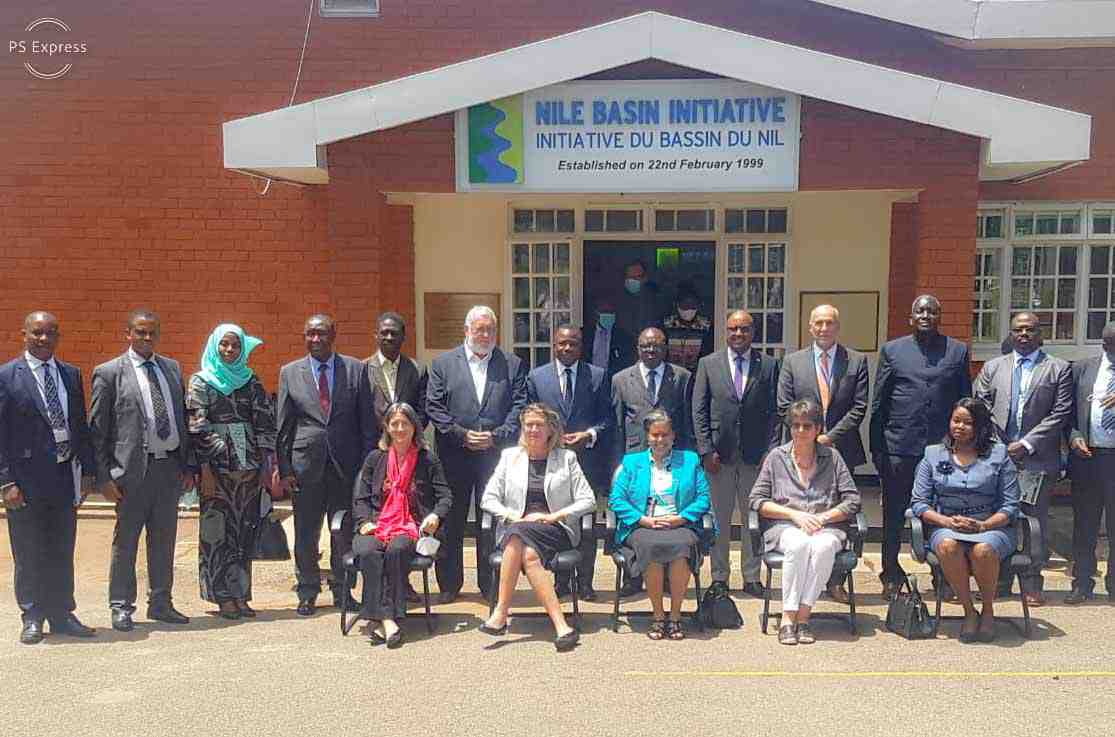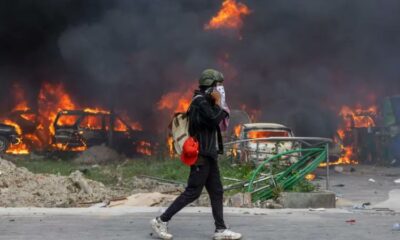Analysis
EU steps up diplomatic ties in Africa while trying to replace Russian energy

EU delegation visited the Nile Basin Initiative in Entebbe and offered to raise their engagement with all transboundary organisations
The European Union is stepping up its diplomatic maneuvers in Africa aimed at strengthening old relationships with the continent, but also aimed finding new sources of energy and other resources to fill the sudden void created by Russia’s war in Ukraine.
The Head of the EU delegation in Uganda Ambassador Attilio Pacifici made no secret of their new sense of vulnerability when he visited the Nile Basin Secretariat in Entebbe recently.
The visitors who comprised different EU member country representatives, explained that the EU needs closer ties with Africa, because of the war in Ukraine.
He said that the EU-NBI cooperation is not just about development projects, it is rather much more of a political cooperation.
“It is about understanding that different regions are bound together for a particular interest and it’s also something that should go the other way. For instance, when we in Europe are in need that is when the real friendship with other regions will be tested. Like now Europe is in need. We are facing challenges. There is a terrible war on the other side of our border. So, we are saying friends should try to understand what we are going through,” said Pacifici.
Ambassador Pacifici also revealed that the regional block including its funding bodies such as the European Investment Bank, – all together referred to as Team Europe, have resolved to support all trans-boundary initiatives within Africa.
Although EU has been a major supporter and funder of NBI activities, the latest meeting comes at a time when the European Union is looking for new sources of oil and gas, following the decision to end its reliance on Russian gas and oil by the end of this year.
EU leaders this week agreed to end imports of Russian energy by the end of 2022, as a way to starve Russia of funds it needs to prolong the war in Ukraine.
The meeting between the EU-Delegation also comes at a time when the 10-member group of countries that form the Nile Basin, is facing a stalemate over an agreement that is supposed to govern the use of the resources of the Nile river.
The Cooperative Framework Agreement (CFA) was agreed by nine of the ten member countries more than 5 years ago. Egypt refused to endorse the agreement preferring to keep the colonial era treaty that granted it and Sudan absolute rights on the waters of the river. Other countries, including Uganda that control the vast part of the sources of the river and its catchment, refuse to honour the colonial pact and instead chose to cooperate and make use of the river in a coordinated fashion.
Despite initial agreement to adopt a permanent framework, only 4 countries have ratified the CFA, stalling its implementation. Some analysts have accused Egypt of using under-hand tactics to frustrate the adoption of the treaty.
But if ratified, the treaty will result into the upgrading of the NBI secretariat into a permanent organ with powers to regulate some of the activities that touch the amount, quality of water that flows in the Nile.
At the end of the meeting with Nile Basin secretariat, the EU envoy expressed a new approach to its ties with the Nile Basin.
“The way we (EU) see this, is that it’s an alliance that is inevitable because the Nile basin Initiative binds countries in this region together geographically,” said Pacifici.
Ambassador Pacifici emphasized the fact that whereas countries can choose to be members of the East African Community or the South African Development Cooperation (SADC), they cannot choose to be or not to be members of the Nile Basin Initiative because they are bound by geography.
“Even someone in the remote areas of the highlands of Rwanda that is in the upstream has consequences downstream. So it’s important that everybody to comes together and comes up with a model or proper way of addressing challenges in this part of the world particularly in this difficulty moment when we are all facing challenges which have a global dimension and not just nation and not regional.”
He praised the meeting they had with the leaders of the secretariat, as a very interesting meeting and to the host nation Uganda.
“I am very grateful for the hosting country – the government of Uganda and we look forward to humbly supporting this process that is purely driven by the countries of this special geographical area.”
He said: “We have also decided two things. Apart from the engagements which will continue strongly and lively. We will visit the projects and activities that have been built by the Nile Basin Initiative with the little support from the European Union taxpayer, focusing on Uganda first. We have also agreed to keep meeting regularly with the representatives of the countries in the region because it is important to keep this dialogue and exchange of views going.”
Nile Basin impacts Europe
The EU envoy explained that activities in the member countries of the Nile have an impact on some of the EU waters.
“There is a clear interest for European Union to be involved because the Nile ends into a place which is part of Europe and that is the Mediterranean sea. So there is an interest to support the initiative because it is something that is a physical bond between this part of Africa and Europe and we cannot just shy away. We will listen and continue to support and we are delighted to see the results, we wish all do our best for the many things this initiative would like to continue to deliver to its people.”
View of Ugandan officials
Representing the Government of Uganda, the Permanent Secretary Ministry of Water and Environment Alfred Okot Okidi, appreciated Team Europe and the member states of the NBI for what he called a historic meeting.
Okidi said that the meeting echoes the need for all the NBI countries to come together as one so that they can manage this important resource and use it equitably for the development of all the people in the basin.
He told this writer that the meeting emphasized the need for cooperation, the need for dialogue.
Okidi further thanked Team Europe for the continued commitment towards NBI, saying that this support is not country specific ‘because we are all looking at the Nile basin where ten countries that are cooperating under the initiative have’.
He stressed the need for cooperation as the best way to resolve the present and future challenges facing the region.
“The most important thing for us is to have the legal framework that cements the cooperation, hence the need to ensure that the Cooperative Framework Agreement is accepted by everybody and ratified so that the basin functions for the benefit of the habitants of the basin,” Okidi added.
Comments


























